BLACK ALUMNI ASSOCIATION NEWSLETTER: February 2023

The End is Near!
BY REV. DR. BRIAN K. BLOUNT
President, Union Presbyterian Seminary – Richmond, Virginia & Charlotte, North Carolina
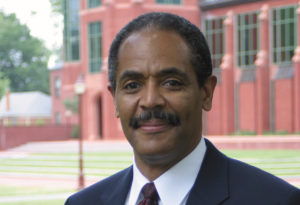
Rev. Dr. Brian Blount
The end is near! That is either a word from the Book of Revelation or a description of where I am in the journey of my professional life. Either way, the saying conjures up anticipatory feelings of both anxiety and joy. For John of Patmos: anxiety that the world is changing so dramatically and sometimes so destructively that he can barely keep pace. Joy that what comes after all that change is the realization of the “Immanuel” promise made on the morning of Jesus’ birth: God, forever, fully present with us. For Brian K. Blount: anxiety that I am on the cusp of transitioning from a life dedicated to both the pastoral and teaching ministries into the delightfully frightening world of “what’s next?”. Joy that I’ll be able to do some of the things I have been holding back on as my administrative, travel, and teaching commitments do not presently allow me the space to pursue them. I am the living embodiment of the phrase “mixed emotions.”
What is undiluted and unchecked is my continuing affection and love for the community of the faithful that is the Union Presbyterian Seminary Family. I am particularly grateful to the company in our community who make up the Black Alumni Association. Since day one of my presidency, even before there was a BAA, the people who now make up the BAA were professing and displaying their support for me and the work of my presidency.
Union Presbyterian Seminary (UPSem) is blessed to have an energetic and involved alumni base. UPSem alumni give financially to support the seminary in strong numbers. UPSem alumni encourage their churches and businesses to support the seminary with their financial strength. UPSem alumni encourage philanthropists whom they know to consider becoming patrons of the ministry of theological education as undertaken by UPSem. Members of the BAA do all of that and more. You have made yourselves an ongoing presence within the life of the seminary, dedicating yourselves to the strengthening of the seminary’s mission and the mentoring of the seminary’s students.
The only alumni constituency of UPSem that meets regularly and programs for the seminary’s well-being, the BAA has developed initiatives like the annual Trailblazer Award that honors one of the seminary’s Black graduates. Looking not only to those who have graduated, but to those who are current students anticipating graduation one day, the BAA has begun a mentoring process designed to encourage the members of the Black Caucus. And living into the inclusive spirit that the BAA champions and presses the seminary to engage, the BAA invites alumni of every ethnicity and race to become members of the BAA and join its support mission for UPSem.
For all of that, I am deeply grateful. From the beginning, you have walked by my side, encouraging me every step of the way. Who wouldn’t be anxious to “retire” from this kind of loving affection and support?
And that’s why I don’t intend to do so. Even though I did not graduate from UPSem back in the day, I feel like UPSem is my seminary home. I know its history. I love its constituencies. I pastor its people. I help shape and then shepherd its future vision. In that way, I believe I have earned a kind of honorary alumni status. And as such, I look forward, upon graduation, to joining the BAA as a full-fledged UPSem alum, fully committed to its ministry of supporting the work of the president, the faculty, the students, and the school. I hope that I can become part of the wave of alumni positive response to your welcoming invitation for membership.
Though retired, I don’t intend to be retiring. That is, retiring in the sense of pulling back from the fullest engagement of life’s opportunities. No, I intend to use this “end time” as a “go time.” Sharon and I are going places. We’re going to learn things, do things, experience things, write things, read things until we are, as my dad likes to say, “all filled up.”
There is, I think, a spirituality to retirement. I intend to explore it. Grow from it. Get all immersed in it. Anticipating that, while remembering how wonderful it has been to have been immersed in the protective presence of the members of the BAA, brings me great joy. So, when I say the end is near, I don’t say it with the doom and gloom of the city preacher crying out of a bullhorn on a crowded street corner. I say it in gratitude, with thanksgiving. For I come to the end of my professional journey in the company of dear and supportive friends. All of you. And just think, my journey as an official member of the BAA is just beginning.
Carter G. Woodson, The Father of Black History Month
BY REV. DR. HELEN BESSENT BYRD
M.Div., Union-PSCE ’07; Ph.D., UConn
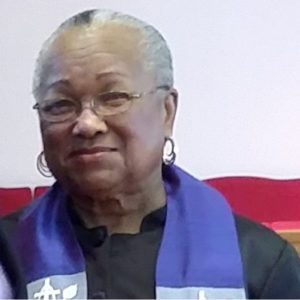
Rev. Dr. Helen Bessent Byrd
If you have sought to learn a lot about Black History, most likely you did not learn it from your public-school history textbooks. This content has been excluded in the past and only minimally treated in more recent years. I will turn four score years old this month and remember the one page on this topic in my fourth-grade textbook in Georgia. There was a picture of a group of people gathered under a tree, some standing, some sitting and two dancing. “The slaves were happy. They enjoyed dancing in the shade after work,” was the caption below the picture.
Carter G. Woodson, a black American born in Virginia in 1915, had to devote much of his youth to helping his father to farm and work in the coal mines of West Virginia to support their family. He taught himself to read and write then went to secondary school and graduated at 20 years old. Woodson entered Berea College in Kentucky, one of my alma maters. Upon graduation, he earned his Master of Arts and Doctor of Philosophy degrees at the University of Chicago.
Concerned that there was such a dearth of written black American history, he founded the Association for the Study of Colored American Life and History in 1926 and began Black History Week which later became Black History Month. Beginning in 1928 a theme has been chosen by this organization annually for study. The theme this year is “Black Resistance in the Past, Present and Future.”
Almost two centuries ago, Rev. Henry Highland Garnett proposed that the only path to freedom, justice, and equality; self-determination; and/or social transformation is resistance. He shouted, “Let your motto be resistance! resistance! resistance!
Black people have accomplished and maintained much success and progress over the many years of Carter G. Woodson’s leadership and life which ended in 1950. He became referred to as the Father of African American History.
The black resistance strategies resulted in the gains of the civil rights period and have served as a model for all of the social movement endeavors of groups in the country such as the women rights; Lesbian, Gay, Bisexual, Transgender, Queer+; Abortion rights, etc.
As we face the present and peer into the future, it is apparent that we must stand with a strong right arm as states seek to abolish black history, eliminate voting rights, and suppress economic gains. Truth in history textbooks would make a Black History Month unnecessary! As Martin Luther King, Jr. reminded us, “Injustice anywhere is a threat to justice everywhere. We are caught in an inescapable network of mutuality, tied in a single garment of destiny. Whatever affects one directly, affects all indirectly.” Let us all work together, black and white alike, resisting racism and promoting unity to build a beloved community.
Black Lives Matter! – “Till”
BY REV. WILLIAM R. FREEMAN
M.Div., Union-PSCE, 2001
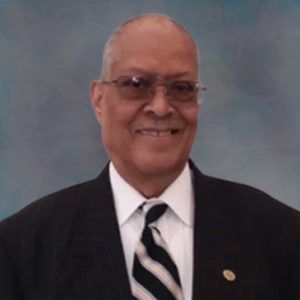
Rev. William R. Freeman
As those of you who read this newsletter know, this author usually discusses issues which highlight the murders of many of our young Black American boys, men and women who are murdered by police officers. Boys, men and women like Tamir Rice, Freddie Gray, Breonna Taylor, Michael Brown, George Floyd, Ahmaud Arbery, Philandro Castile, Eric Garner, Sean Bell, Amadou Diallo, and the list goes on. However, this article is not about another murder by police officers. No, this article is about a civilian lynching as told in a recent movie. A movie entitled “Till”, which I reluctantly took my wife to see this past November, 2022.
Till is the story of a young Black boy named Emmett Till, living with his widowed mother in Chicago, Illinois whose husband, Emmett’s father, was killed in WWII. Till is the story of the love of a Black mother for her teenage son and his love for his mother. Till is the story of a mother who knows that in the 1950s, although there is racism in Chicago and other northern cities, it is not as bad and as rampant as the OVERT racial caste system of the Mississippi Delta, Alabama cotton fields or Louisiana swamps.
Till is the story of a mother, who has a premonition, and would really rather her only son stay in Chicago and not go South. And, it is only after a visit from her uncle who lives in Mississippi that she finally agrees to let her “baby” get on a train with his great uncle — the last time she will see the boy alive.
I mentioned earlier that I reluctantly went to see this movie because in August, 1955 I, too, was a Black boy of 15. And, although my immediate family lived in the village of Harlem, New York City, I also had cousins “Down South” in Alabama and Tennessee, which, as I said, were as racially segregated as Mississippi. My mother had a brother, after whom I am named, who lived in Chattanooga, Tennessee. On several occasions “Uncle Willie” would drive up to Harlem to visit his sister and mother and would ask if he could take me back to Tennessee and Alabama to visit my other uncles, aunts and cousins. Thank God, my wise grandmother, who I believe had the same premonitions as Mrs. Till, ruled our house; and, whose father and grandfather had been slaves, always overruled my mother, step-father, and her oldest son. The answer was always, “No! You’re not taking my oldest grandson back down there!” AND, this was years before the picture of Emmett Till was on the front page of the Amsterdam News which was a weekly Black newspaper delivered by an older Black man who would walk up and down the sidewalk loudly shouting out the headlines. On this particular morning he was shouting, “Read All About it! Fourteen-year old boy Emmett Till murdered in Mississippi!” “Read All About It!”
My dad, also a WWII veteran, would always buy the paper and leave it for my mother, my younger brother and me to read. My grandmother could not read too well so I would always read the news to her.
Well, this particular morning the paper was not left for me and my brother. When we asked to see it, my dad said NO! The picture of Emmett Till was not something we could look at which, of course, made two teenage boys want to see it even more. Later that day, another boy had gotten hold of a copy and we could see why daddy didn’t want us to see the terrible mutilated body of this young Black boy who was our age. And, although it’s been 67 years since I saw that photo of 15-year old Emmett Till’s lynched, deformed, decayed body lying in that casket on the front page of the Amsterdam News, it was, and still is, something I will never forget, and is the reason, this 83 year old preacher had second and third thoughts about reliving that experience all over again.
Emmett was 14 or 15 at the time he was murdered and castrated. I was 15. He was visiting cousins in Mississippi. I could have been visiting cousins in Tennessee and Alabama! Thank God, my grandmother overruled my mother, step-dad and uncle. As a Christian believer and Retired United Methodist Elder, I believe God had plans for my life and was in the middle of my grandmother’s decision.
Many of Mrs. Mamie Till Bradley’s friends and advisors wanted her to leave the casket closed. But to her credit, determination, and tenacity, she wanted the world to see what Mississippi had done to her beloved son. She wanted the world to see what racism gone rampant can do, even to children.
Know this as well: racism is still alive and well today in more places than just Mississippi, Tennessee, and Alabama! Let us stand in unity until our nation is a beloved community where stories like Till no longer recur.
Gems for the Journey: While Men Slept
BY REV. VERONICA THOMAS
MSW, Virginia Commonwealth University ’73; M.Div., Union-PSCE ’07
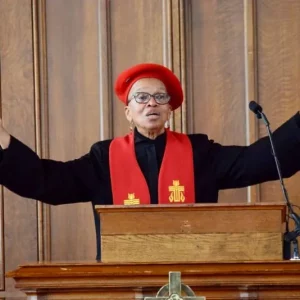
Rev. Veronica Thomas
In Matthew 13:24-30, Jesus drew this parable from commonplace things, things that were at the fingertips of the people of the day. He gave them great spiritual truths illustrated by things they knew and could see. Someone has put this concept in verse — “He talked of grass and wind and rain And fig trees and fair weather, And made it His delight to bring Heaven and earth together.”
Jesus gives us a picture of a man who sowed seed. The sower, or planter of the kingdom is the son of man, Jesus. All the affairs of this kingdom are in the hands of Jesus Christ. The field, or place of the kingdom, is the world. The world is called “His field.” The kingdom of heaven is not a geographic location, but a spiritual realm where God rules and where we share in his eternal life. We join that kingdom when we trust in Christ as our Savior. The seed, or subjects are the children of the kingdom. The seed with which he sows the field has cost Him much – redeemed with His own precious blood. We as God’s children must die unto sin before we can live unto God.
In this parable, the man sowed good seed in his field and while the servants slept the enemy came. Remember the sower is the Lord, and He neither, slumbers nor sleeps. Satan is the enemy, and he sows tares among the wheat. The weeds are false doctrine. There’s a great deal of that type of sowing today.
As wheat and weeds first begin to grow, it is difficult to distinguish between them. The sower knew who was responsible for the tares. This is a very important picture to see and to interpret. Our Lord says, “Don’t try to pull up the tares. Let them both grow together and when they finally head up, you will be able to recognize which are tares and which are wheat.”
Where did the weeds come from? He answered, “An enemy has done this.” The weeds are the children of the wicked. The title “children” reveals their very close connection with the devil. While growing together in the field there may be a seeming likeness, but their origin and character are entirely different. Regeneration is the only remedy for the weeds.
The enemy is the Devil. It was while men slept that the Devil sowed the weeds. It is when we as Christians cease to watch that the devil comes, and his awful work is silently and quickly done. An enemy has done this. Every seed sown by the son of man is good.
The harvest is the end of the world or age. “Let both grow together until the harvest. So, the grace of the master spares the weeds for a time; but sparing grace is not saving grace. While abiding among the wheat their privileges are the same, but the nature of the weeds unfits them for the heavenly garner. The end will come as sure as the seed time when all that offends shall be gathered.
The reapers or servants are the angels. These impartial servants will in no wise be hindered in their mission. Their first work is to put away all scandals and all that is unjust. They gathered the weeds, bound them into bundles and cast them into the fire. The weeds are not made for the fire, but the fire for the weeds. The Lord knows them that are His. The young weeds and the wheat look the same and can’t be distinguished until they are grown and ready for harvest. Weeds (unbelievers) and wheat (believers) must live side by side in this world. God allows unbelievers to remain for a while, just as a farmer allows weeds to remain in his field so the surrounding wheat isn’t uprooted with them. At the harvest, however, the weeds will be uprooted and thrown away. God’s harvest judgment of all people is coming. We are to make ourselves ready by making sure that our faith is sincere.
At the end of the world, angels will separate the evil from the good. There are true and false believers in churches today, but we should be cautious in our own judgments because only Christ is qualified to make the final separation. If you start judging, you may damage some of the good “plants.” It’s more important to judge our own response to God than to analyze others’ responses.
True believers are those who have trusted Christ as Savior, all resting in Him, and love His word. This is the real test. Don’t be disturbed that the weeds and wheat are growing together. One day the Lord will put in His sickle and separate the weeds and the wheat. I am thankful it will not be my job because I am afraid I would pull up some of the wheat.
During this month of February, Black History Month, I am reminded that we as Christians today find ourselves as the sower in our scripture.
- While we sleep (are not attentive) the enemy comes and snatches God’s plan for our lives. We must capture or receive the vision and be active doing the work to accomplish our objective. Martin Luther King Jr. was a visionary leader, on August 28,1963 in his famous “I have a dream” speech, his words painted a picture of what our lives would be like living together in harmony as a beloved community. Did we receive his vision? There is unfinished business. Are we doing the work?
- While we slept – By Jan 24, 2023 the United States had already recorded 39 mass shootings (minimum of four people injured or killed).
- While we slept – A 6 year old boy shot his 25 year old kindergarten teacher in the classroom during a lesson.
- While we all sleep – Elected and appointed officials must get beyond thoughts and prayers for victims and their families and get down to the real business of gun control and background checks. Get the assault weapons off our streets!
Wake up everybody! Let us Christians stand up for righteousness and walk in love. Let us sound the alarm: “He has shown you, O mortal, what is good. And what does the Lord require of you? To act justly, and to love mercy, and to walk humbly with your God” (Micah 6:8).
Harold Melvin and the Blue Notes remind us:
Wake up everybody no more sleeping in bed
No more backward thinking time for thinking ahead
The world has changed so very much From what it used to be so
There is so much hatred war an’ poverty
Wake up all the teachers time to teach a new way
Maybe then they’ll listen to whatcha have to say
Cause they’re the ones who’s coming up & the world is in their hands
When you teach the children teach em the very best you can
The world won’t get no better if we just let it be
The world won’t get no better we gotta change it yeah, just you and me . . . .
Come on You preachers
Start preachin’ what you teach
Teach the truth
Wake up, preachers
All liars (all liars)
Politicians
Stop lyin’ (stop lyin’)
Ain’t don’t matter
What race, creed or color
Everybody we need each other
Wake up, everybody. . . No more sleepin’ in bed
No more backward thinkin’ Time for thinkin’ ahead
A Return to Cooperative Economics
BY REV. DR. LEONARD EDLOE
Pharm.D. UFL ’03; M.Div. STVU ’99; Th.M UPSem ‘2018
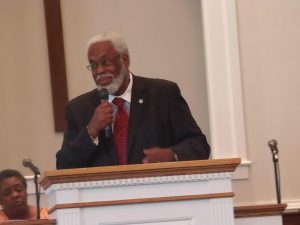
Rev. Dr. Leonard Edloe
As 2022 came to an end I decided to share on a daily basis the principles of the cultural holiday some of us celebrate as Kwanzaa on social media, the fifth principle of which is called Ujamaa or Cooperative Economics. The goal of this principle is to build and maintain our own stores, shops, and other businesses and to profit from them together.
As Africans in these United States, we have a long history of Cooperative Economics that flourished for many years because of segregation and racism. There was a Black Wall Street in Tulsa, Oklahoma. Second Street in Richmond, Virginia was also labeled a Black Wall Street. In just a few short blocks there were restaurants, hotels, service stations, banks, insurance companies, a movie theater, and the homes of a few fraternal organizations. Segregation forced us to have to buy from each other and, when we traveled there was “The Green Book” that was used to find places to dine and respectable accommodations for overnight lodging.
When I shared the post on Ujamaa, one person commented as if Cooperative Economics was something new to me. I had to inform the person making the comment that I was born into a spirit of Cooperative Economics. When I first entered pharmacy school, my father told me a story and showed me a newspaper clipping. He told me that in 1931 when he graduated from pharmacy school in Washington, D.C., many of his fellow graduates only had two options: 1) open your own pharmacy or 2) go to work at the post office. The news clipping, he showed me listed all of the pharmacists who had passed the board. There was a space separating the names followed by the word colored. Below that my father’s name was listed. We were forced to live in a society that negated us, negated our very being!
White America used religious and educational institutions of the nation as well as societal norms to enforce theology and education that Negroes were less human than white people. Even though during and after Reconstruction many Black people built and operated exceptional businesses, because blackness had so many negative connotations during the period of slavery, many of us fled the very institutions we had built once integration became the law of the land; along with Mr. and Mrs. Jim Crow!
Black owned hospitals provided care in many cities throughout these United States. Yet today, there is only one that remains open, Howard University Hospital in Washington, D.C. There was even a move a few years ago by the University to sell the hospital. Fortunately, the effort was terminated.
Theology is in many senses the only way we can restore our communities economically. While many religious communities might frown on this idea, misquoting I Timothy 6:10 by saying, “Money is the root of all evil”, rather than “The ”L*O*V*E” of money is the root of all evil”, or using the story of “Jesus throwing the money changers out of the Temple” have discouraged any discussion on economic activities that many Churches could inspire to economically build up our communities.
Dr. Gordon B. Hancock, former pastor of the Moore Street Baptist Church in Richmond, Virginia preached about the double-duty dollar. Spend your dollars to obtain something that you need and try your best to spend those dollars with a black-owned business. Money is the life blood of a community. If our blood only circulated in our bodies once, we would all die. A dollar only circulates for six hours in the Black community, while it circulates for 20 days in the Jewish community, and 30 days in the Asian community. It is estimated that Blacks have more than $1.3 trillion in gross national income but only two percent is recirculated in the Black Community according to a study by the Black Star Project.
In my thesis for my Master of Theology degree, Restoring the Glory in the Rural Black Church, I devoted an entire chapter to Economic Development. Economic Development that happened in those Black Wall Streets occurred with the support of the Black Church. It is happening right now, and it can happen even more if Churches come to grips with the status of the communities they serve.
As stated earlier, I grew up in an atmosphere of Cooperative Economics. My father, at his pharmacy, would pay high school students to deliver prescriptions and also provide places for them to study after they completed their deliveries. One of these students became the Director of The Pittsburgh, Pennsylvania Model Cities program. I hired a young woman who wanted to become a nurse. During her final year in college, she needed a car to complete her clinical rotations. I made sure she had a car. Today, she is a Neo Natal Nurse Practitioner.
Currently, at the Church where I serve as pastor, we teach financial literacy. We have also established a café where members can purchase snacks that they would normally purchase at convenience stores. In many instances when a person applies for a job, they are asked, where have you worked before? The café serves as that experience for our younger members.
At a previous pastorate, a couple wanted to start a lawn service. They asked the Church for assistance, with the stipulation that the Church lawn would be cut at no charge. The Church refused to assist that couple. As pastor, I assisted the couple and the business turned out to be a success.
Those of us who have been blessed must start making a difference!
Somebody helped all of us in this journey called life!
Although only Jesus can save this world, all of us can make a difference in the life of at least one person. And if that one person did the same? Think of how much better our communities would be!
In most of our communities, the Church is the only institution we control. And the Church, especially the Black Church, needs to step up and make a difference both spiritually and in a secular way – the only way most of us will have that abundant life that Jesus wants us to have.
The Church in Book of Acts was an example of Cooperative Economics, an example that the Black Church needs to emulate today.
Giving to Your Alma Mater
BY REV. DR. HELEN BESSENT BYRD
M.Div., Union-PSCE ’07; Ph.D., UConn ’72
There’s almost no better way for college graduates to thank their alma maters than by writing a check. — Delece Smith-Barrow
Indeed Ms. Smith-Barrow asserts an excellent point. Administrators appreciate and indeed count on alumni support of the schools that they attended. I will add, however, that the concept articulated in the quotation above is broadened or expanded in at least two ways today. The first is expansion of the referenced institutions and the second is variety of modalities for the gifts.
Indeed, all institutions of learning appreciate gifts from former students whether they are elementary or secondary schools, colleges or universities as well as technical or trade schools. Gifts are a valued mechanism for expressing recognition of the students’ value of and thanks for the education that they received whether they matriculated at the site through graduation or had to move on and completed their program at a different institution.
Now, the second way that the concept in this quotation is expanded that the gift financial gift may be delivered in several modes other than a check. These include real property, bequests of a specific dollar amount or percentage left in the former student’s will or trust; beneficiary of a life insurance policy; or give an IRA rollover, etc.
Show your gratitude to your alma mater, UPSeminary! Remember, “Give, and it will be given to you. Good measure, pressed down, shaken together, running over, will be put into your lap; for the measure you give will be the measure you get back” (Luke 6:38).
See the website for giving opportunities. For tracking purposes, when you give, write BAA on the line with your name if you give online and on the memo line if you send a check!)








